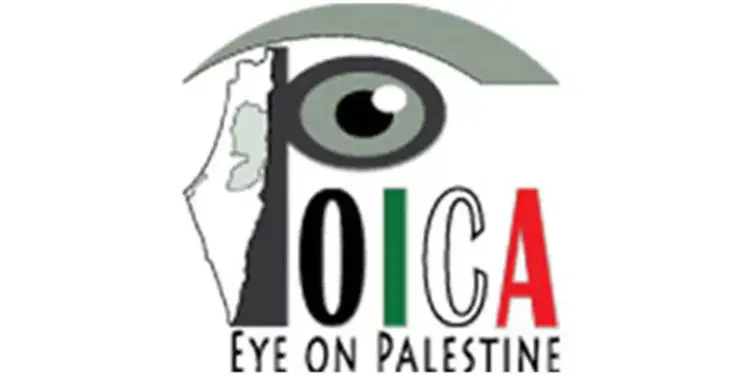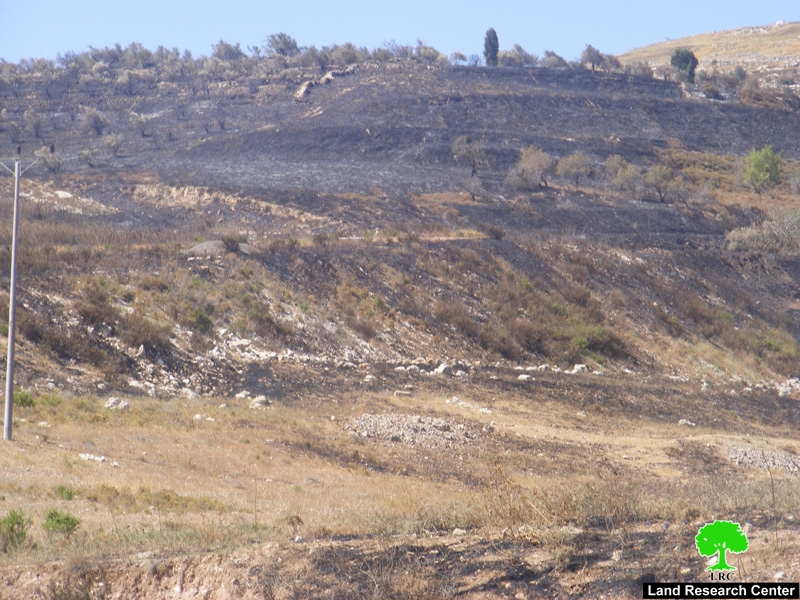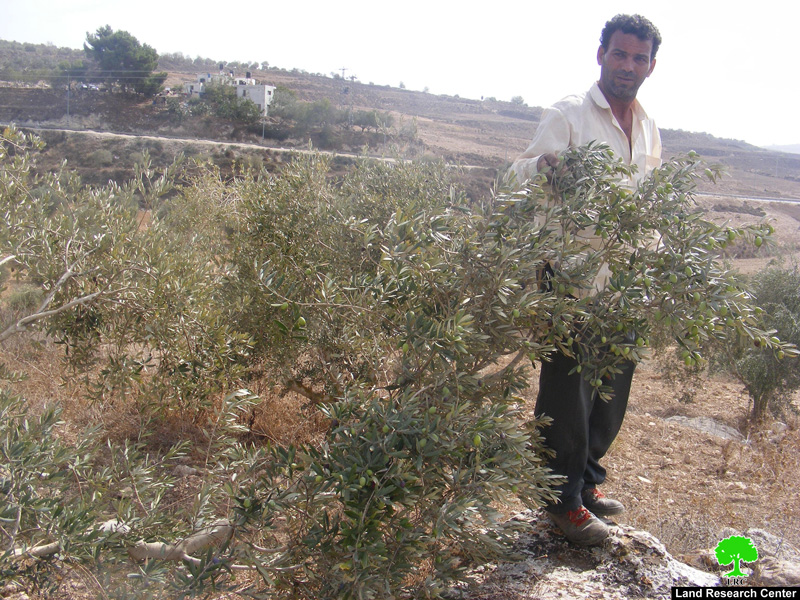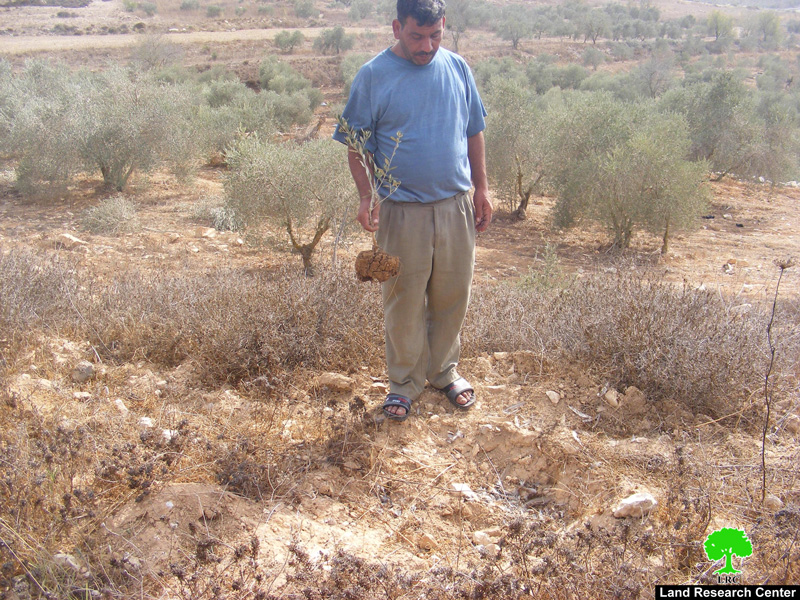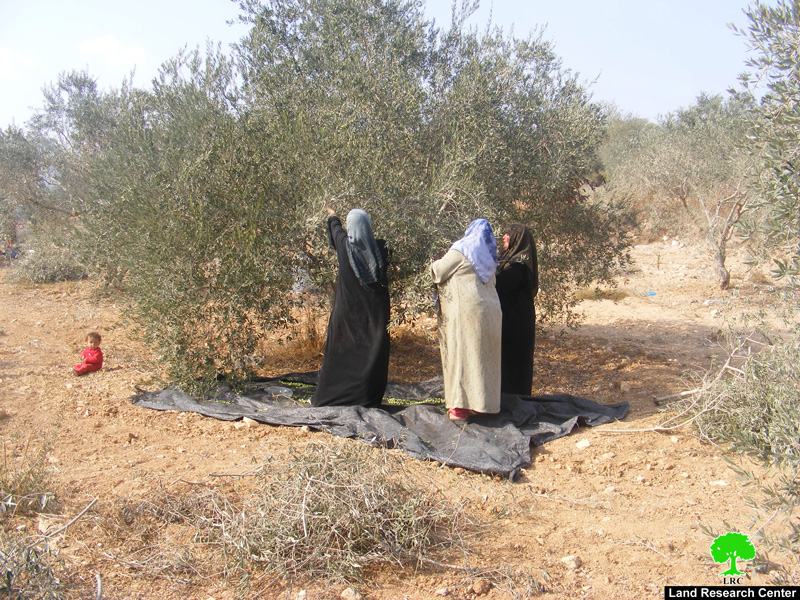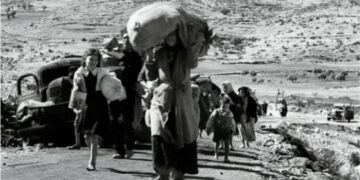Forward:
The olive harvest season has come back in 2008 in tense and sad conditions due to the violations and attacks carried out by Israeli occupation forces and colonists. Large areas filled with olive tress were plowed for the benefit of Israeli colonies and the Racist Israeli Isolation Wall. Not only Palestinian lands were confiscated, Israeli occupation soldiers prevented Palestinian farmers from reaching their lands behind the Wall while declaring areas around colonies as Closed Military Zones.
In terms of the lands located behind the Wall, its owners are finding it increasingly impossible to reach them after the Israeli occupation have set up 66 gates in the Wall 27 of which are not usable for civilian access. As for the remaining 37 gates, they are used by Palestinian farmers only after they get a special permit from the so-called Israeli “Civil Administration” which placed condition impossible to be met by the land owners. Such conditions include the necessity of having a land ownership deed, the owner’s ID in addition to submitting individual requests for permits. Even if all the required documents were submitted as requested, Israeli occupation authorities deliberately delay issuing the needed permits while sometimes it issues only permits for one individual of a family without issuing it for the rest. That is despite the fact that collecting olives is usually a collective effort in which all members of the family (including men, women and children of all ages) participate.
The Village of Burin: A Victim of Yetzhar Colonists’ Attacks:
The village of Burin is located in the Governorate of Nablus and is very close to the colony of Yetzhar. It’s been a frequent target of waves of colonists’ attacks stemming from the colony of Yetzhar. During the current olive picking season colonists threw stones at Palestinian olive collectors which led to the injury of the 47-year old Mr. Mustafa Ahmad Hamad Najjar in the head. The father of 6 was transported to Rafidia Hospital to treat his injuries.
Mr. Najjar gave the following testimony for the Land Research Center’s (LRC) field researcher: 'At 6:00 AM on October 10th, 2008 I arrived along with my wife, brothers, their wives and two of my cousins (ages between 6 and 10) to our land to collect olives. The land is located 4 kilometers away from the village and about 600 meters away from the colony of Yetzhar. We were not able to reach it in the yester years due to the attacks by the colonists who cutoff more than 200 olive trees at the beginning of the Intifada belonging to Mohammad and Musbah Hussein. A number of other trees were also burnt.'
He continued: ' My land is about 4 dunums filled with olive trees. I was surprised to see that the branches of 9 olive trees were broken. I knew then that the colonists have done that as no one would benefit from damaging my trees except them. We proceeded to collect the olive until 10:00 AM when we took a break to have our breakfast. We had a large number of farmers around us collecting their olives, too. I then noticed a number of colonists at a distance of 300 meters away from us. They were accompanied by a number of occupation soldiers. When they became 30 meters away from us they started throwing stones at us. I asked my brother to get the children away from harm’s way and then started shouting for help. Occupation soldiers started firing in the air in an effort to disperse us while colonists continued to throw stones and cussing at us using bad language. I was hit with a stone over my left eye. I felt dizzy before receiving a number of stones in my shoulder. I become unconscious afterwards. The colonists were stationed on top of the hill which gave them an advantage. My brothers called the ambulance for me which transported me to Rafidia Hospital. I am still in pain. I cannot practice my work as a taxi driver due to pain which negatively affected my family’s income. '
Photo 1: The fire caused by Yetzhar colonists in the village of Burin in June 2008-12-16
The Village of Kufr Qadoom, Qalqilia, and Attacks of Kedomim Colonists:
The colonists of Kadomim attacked a number of Palestinian farmers collecting olives from their lands located in the vicinity of the colony. One of those attacked was the wife of the head of Kufr Qadoom’s Village Council who was accompanied with international volunteers helping in collecting the olives from her land located 2 kilometers away from the village. Prior arrangement and coordination with the so-called Israeli “Civil Administration” was done as to reduce to the minimum the chances of being attacked by the colonists.
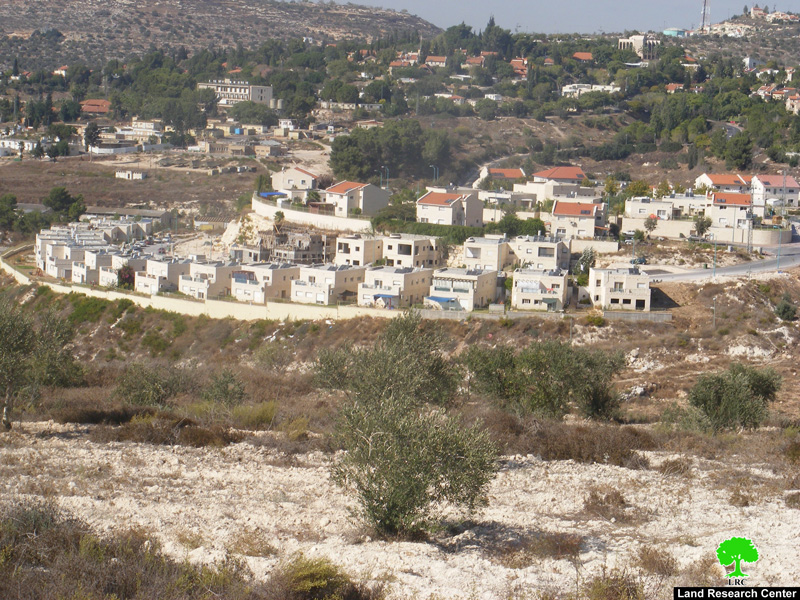
Photo 2: The colony of Qadomim expanding on the expense of Kufr Kadoom lands.
Mrs. Kafa Abdel Kareem Mohammad Shitawi lives in the village of Kufr Qadoom. She was a witness to the attack carried out by Kadomim colonists in one October day. She relayed her testimony to LRC’s field researcher: ' At about 7:30 AM on Monday October 20th, 2008 I went along with 3 international volunteers towards our land 2 kilometers southeast of the village. It is also located 1.5 kilometers away from the colony of Kadomim near the By-Pass Road 55. A number of colonist mobile caravans were placed on a piece of land right next to mine. When the taxi driving us stopped near the By-Pass Road to drop us, a medium-built bearded colonist started to scream and yell as us in Hebrew. In a minute a large group of colonists appeared from nowhere. They were not armed. Most of them were youth of age ranging between 20 and 40 years old and were wearing the Keppa (i.e. they were religious Jews). They came down from the opposite hill in which the mobile caravans were situated. As a natural reaction, we stayed in the taxi to protect ourselves. The colonists reached the car and surrounded us from all directions. When we went out of the taxi, the 70 colonists started verbally abusing us and kicking the taxi. We were lucky that they were not armed. They have threatened to kill us if we do not leave immediately. '
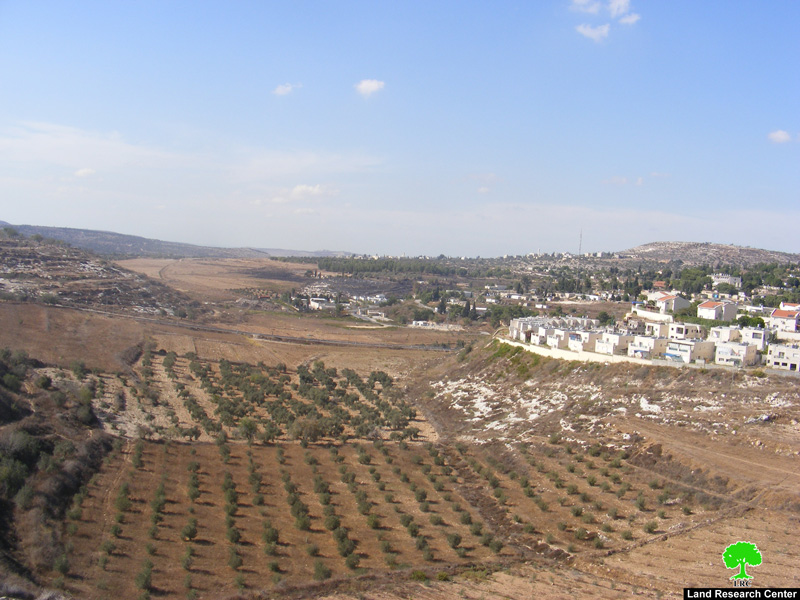
Photo 3: Large areas of Palestinian lands in the vicinity of the colony
of Qadomim to which Palestinians are allowed access.
He continued: ' As for the 3 international volunteers, they have tried to talk to the colonists in an attempt to convince them not to attack us. Yet, the colonists surrounded them and began cussing them off while physically pushing them around in a humiliating manner. As for me, I was forced into the taxi while the colonists threatened to set the taxi ablaze if we do not move at once. The volunteers were not allowed in. I told the driver not to move without them. It took the volunteers around 7 minutes to get into the taxi as the colonists tried to physically hurt them. When they managed to get into the taxi, we drove about 200 meters away from the colonists. We stopped and got down in an effort to reach my land. I called my husband to inform him about the on-going situation. In turn, he called the Palestinian DCL who contacted the Israeli Police to try and stop the colonists. At around 9:30 AM a large Israeli force came to the location. Upon arrival they declared that area as Closed Military Zone and prevented the internationals from working with the Palestinian farmers especially in the areas close to the caravans. However, colonists were allowed to move around freely under the pretext that they have a Jewish religious holiday on that day'.
Photo 4 & Photo 5: Palestinian farmers from Kufr Kadoom inspect their
trees uprooted by Qadomim colonists
The Village of Azmout and Elon Moreh Colonists’ Attacks:
The colonists of Elon Moreh attacked the family of Mr. Mustafa Mahmoud Abdel Khaliq Thawabta while collecting their olives. Mr. Thawabta was physically injured with multiple bruises in different parts of his body which necessitated moving him to Rafidia Hospital for treatment.
Mr. Thawabta gave the following testimony to LRC’s field researcher: ' At about 1:30 PM on Saturday October 18th, 2008 I was with my family collecting olives in the eastern side of the village in a location called Umm Al Toyyour. The land is located 2 kilometers away from the village and 3 kilometers away from the colony of Ellon Moreh. We were surprised to see 10 colonists coming from the direction of the colony towards us. I then told my wife to pack up the collected olives and get ready to leave before the colonists reach us. They were running towards us and when they became 30 meters away they started throwing stones at us. When they became close to us, two of them punched me hard. I felt as if I “flew” from my place. They continued to throw stones at us which led to our injury. The colonists, then, stole our collected olives. They were placed in 4 bags the capacity of each was 30 kilograms. They were only able to carry them for a distance of 10 meters as they were very heavy for them. When they could not carry it even further, they busted the bags open with their knives and threw the olives on the ground. We left our land feeling depressed and shaken. My wife was injured in her back while my daughter, Fida, received a stone in her arm. I went to the hospital as I felt pain in most parts of my body. I wasn’t able to go to sleep for days without pain killers.'
Photo 6: Palestinian ladies from the village of Azmout collecting olives.
The aforementioned attacks and violations were not the first nor will they be the last as long as the colonists continue to be present on our Palestinian land. The LRC has documented around 20 violations and attacks committed by the Israeli occupation forces and Israeli colonists in a number of Palestinian governorates north of the West Bank during the olive harvest season. The following table lists these attacks:
|
Governorate |
Location |
Date of Incident |
Violators |
Violation |
|
Qalqilia |
Amatin |
2/10/08 |
Qadumim colonists |
9 dunums of Amatin lands were set ablaze. 6 Palestinian farmers own the burnt lands. |
|
Qalqilia |
Kufr Qadoom |
2/10/08 |
Israeli Army and Qadumim colonists |
Under the protection of the Israeli occupation forces, the colonists kicked out a group of Palestinian farmers from the village of Kufr Qadoom working in “Khalayel Abu Mujahid” location. |
|
Qalqilia |
Kufr Qadoom |
2/10/08 |
Qadumim colonists |
A group of colonists took control of a piece of land owned by Mr. Ahmad Abdullah Qabsis located on the main road connecting between Qalqilia and Nablus. The colonists burnt down olive trees in 28 dunums. |
|
Qalqilia |
Kufr Qadoom |
5/10/08 |
Israeli Army and Qadumim colonists |
The Army threw out 12 Palestinian farmers from their land in Khillat Abu Mujahed under the pretext of not having a permit to access their lands to collect olives. |
|
Qalqilia |
Marj Al Khoukh |
5/10/08 |
Israeli occupation Army |
The closure of the 2-km Marj Al Khokh Road and the 4-km Khillat Al A’ama Road. The two roads serve 560 farmers. |
|
Qalqilia |
Kufr Qadoom |
11/10/08 |
Qadumim colonists |
Colonists stationed at Oadela mountain, located south of Kufr Qadoom, attacked 6 farmers during the olive harvest season. |
|
Qalqilia |
Kufr Qadoom |
12/10/08 |
Qadumim colonists |
A rampage by the colonists against Palestinian olive collectors in the vicinity of Odela Mountain |
|
Qalqilia |
Kufr Qadoom |
19/10/08 |
Israeli occupation Army and Border Police. |
The eviction of 13 Palestinian farmers from their lands in Al Miras area located 500 meters south of the colony of Qadumim under the pretext that the farmers did not make prior coordination with the so-called “Civil Administration.” Physical skirmishes between the farmers and their international supports, on the one hand, and the Israeli soldiers on the other. 3 internationals were arrested for 4 hours before being released. |
|
Qalqilia |
Kufr Qadoom |
24/10/08 |
Israeli occupation Army |
The Army dispersed a demonstration carried out by Palestinians and international volunteers protesting the on-going attacks by colonists against Kufr Qadoom residents. |
|
Qalqilia |
Jinsafut |
26/10/08 |
Karni Shomron colonists |
Israeli colonists from the Karni Shomron colony pumped sewage and grey water into Palestinian lands located beyond the Wall leading to damaging 200 agricultural dunums. The colonists also stole 400 olive bags weight of each is 50 kg. |
|
Qalqilia |
Kufr Qadoom |
5/11/08 |
Israeli occupation Army |
The beating of Mr. Mohammad Abdel Latif Obeid and members of his family after being stopped for long hours during harvesting their olives in Jabal Mohammad. |
|
Tulkarem |
Al Ras |
5/10/08 |
Israeli occupation Army |
Preventing Palestinians from reaching their lands located behind the Wall using their tractors. They wee allowed to reach it only by foot. |
|
Tulkarem |
Qiffin |
7/10/08 |
Harmish colonists |
The colonists set Qiffin lands located beyond the Wall ablaze. Israeli occupation forces prevented fire engines from reaching the location. Farmers were allowed to reach it only on foot. Since the establishment of the Wall, more than 1500 dunums of Qiffin lands were burnt. |
|
Tulkarem |
Kufr Al Labad Shofa |
16/10/08 |
Israeli occupation Army |
Israeli soldiers closed down the main road in the Kufr which prevented the farmers from reaching their land to collect the olives using their tractors. |
|
Nablus |
Dier Al Hatab |
6/10/08 |
Elon Moreh colonists |
The colonists placed 4 mobile caravans on Dier Al Hatabs’ lands in the locations of Al Dush and Al Sho’oon. The two locations cover an area of 500 dunums filled with olive trees. The 17 owners of the trees were getting ready to collect their olives when the caravans were established. |
|
Nablus |
Kufr Qallil |
11/10/08 |
Barakha colonists |
The colonists attacked olive collectors injuring 6 of them including Hisham Fayez fathi (8 years), Amani Mansour (20 years), Fathi Rashid (70 years), Madiha Awad (12 years), Ibtisam Nassar Rashid (30 years) and Manal Wasfi Nassar (30 years). |
|
Nablus |
Azmout |
19/10/08 |
Ellon Moreh colonists |
The colonists attacked 7 Palestinian families while collecting olives |
|
Jenin |
Al Tayba |
9/10/08 |
Israeli occupation Army |
Occupation authorities confiscated the permits of 15 farmers and prevented them from reaching their lands located beyond the Wall to collect the olives. |
|
Jenin |
Al Tayba, Rummana, Zabbouba, A’anin |
10/10/08 |
Israeli occupation Army |
Occupation forces kept denying access to farmers from Jenin to reach their lands to collect olives in villages located near the Wall due to “Jewish religious holidays.” |
What's Next :-
Israeli occupation forces and the Israeli colonists have transformed the olive picking season in Palestine from a happy and joyous occasion into a journey of pain and agony. Occupation forces have damaged around 42,000 dunums. Around 19,000 dunums are unreachable by its rightful owners as it is isolated behind a giant Wall while 15,000 additional dunums located in the vicinity of colonies have become inaccessible. An additional 8,000 dunums were damaged by colonists and their colonizing activities. As such, the quantity of lost olive oil for this season due to the aforementioned violations is estimated to be 2100 tons valued at $ 8.4 million is losses. The real loss is much higher as the uprooted and burnt olive trees were not counted herein.
As such, the Land Research Center reaches out to the Palestinian and Israeli negotiating cadres to directly interfere to stop these violations that create an explosive situation that might erupt at any given point in time.
Prepared by:
The Land Research Center
LRC


